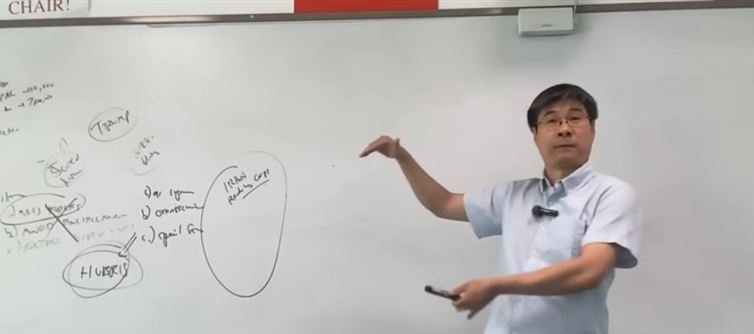
The image accompanying the tweet shows a lecturer, identified as the video’s creator, standing before a whiteboard covered with handwritten notes and diagrams. The whiteboard includes terms like "Trump," "Iran," and "Happy," suggesting a strategic breakdown of political and military scenarios. The video, part of the Predictive history series hosted by a channel with 85.3K subscribers, has garnered 14K likes and significant engagement, reflecting its growing influence. The channel’s premise, inspired by Isaac Asimov’s concept of "psychohistory," aims to predict future events based on historical patterns and game theory.
Shark highlights that the lecturer, a year ago, accurately predicted Donald Trump’s 2024 election victory and his subsequent instigation—alongside Israeli prime minister Netanyahu—of an attack on Iran. The video argues that this conflict, framed as a preemptive strike against Iran’s nuclear capabilities, would be a strategic misstep. The lecturer posits that while the U.S. hopes to trigger a rebellion against the Iranian regime, the Persian population would likely rally behind their government, complicating the war effort. This prediction appears to align with recent reports of increased U.S. military assets in the gulf region, as noted in follow-up tweets.
Further, the video suggests a grim outcome for the U.S., predicting encirclement of American forces in Iran’s mountainous terrain, insufficient troop mobilization (requiring 3 million soldiers against Iran’s 90 million population), and vulnerable supply lines. The lecturer forecasts a 2027 escalation, potentially involving a false flag operation like a mall shooting to garner public support for war, a scenario that has fueled online speculation.
The thread expands into a detailed analysis of the Iran-Israel-U.S. dynamic, using game theory to explain each player’s motives. iran seeks national unity and regional dominance, israel aims to weaken both rivals to assert Middle Eastern hegemony, and trump leverages chaos to consolidate power domestically. This convergence, the lecturer argues, makes a U.S. ground invasion of iran highly probable, potentially igniting a larger conflict, including World war III.
The discussion also delves into biblical prophecies, linking the conflict to the concept of a "Greater Israel" and the rebuilding of Solomon’s Temple, which could escalate tensions into a Jewish-Muslim holy war. This eschatological perspective, shared by some religious Zionists and Christian evangelicals, adds a cultural dimension to the strategic forecast.




 click and follow Indiaherald WhatsApp channel
click and follow Indiaherald WhatsApp channel